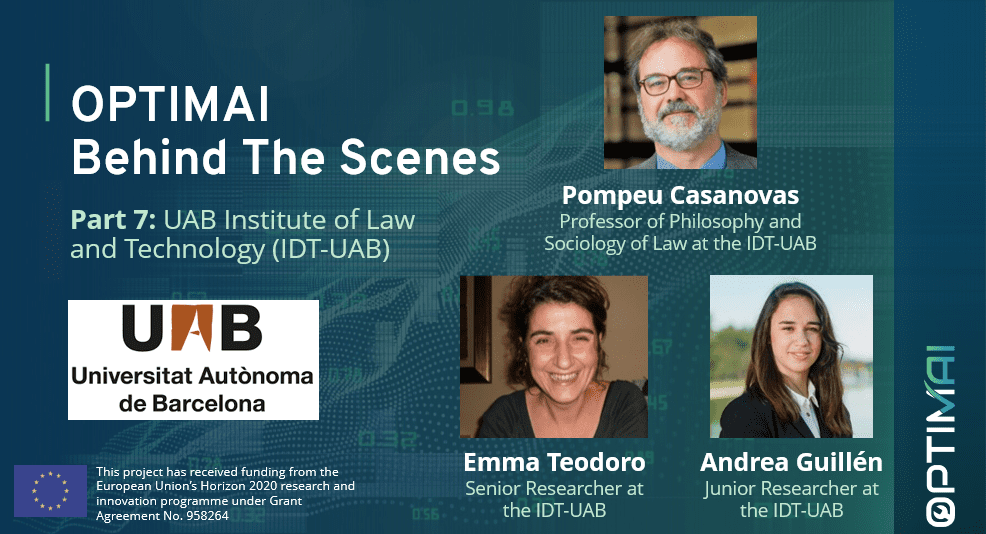
In Part 7 of our Behind The Scenes series, we are joined by Dr. Emma Teodoro, Senior Researcher at the Institute of Law and Technology at the Autonomous University of Barcelona (IDT-UAB), along with Andrea Guillén, Junior Researcher at the IDT-UAB, and Pompeu Casanovas, Professor of Philosophy and Sociology of Law at the UAB Law School; Founder and Director of Advanced Research of the IDT-UAB; Research Professor at La Trobe Law School (La Trobe University, Australia); and Honorary Professor Royal Melbourne Institute of Technology RMITCentre for Applied Social Research.
Thanks for speaking to us today. Could you start by introducing yourselves and telling us where you are based?
We are Prof. Pompeu Casanovas, Dr. Emma Teodoro, and Andrea Guillén researchers at the Institute of Law and Technology based at the Autonomous University of Barcelona (IDT-UAB).
The IDT-UAB is a research institute housed in the Law Faculty of the Autonomous University of Barcelona that combines multidisciplinary research in the field of Law and Technology. Our research areas include Law and Data-Driven Technologies, legal ontologies, the Semantic Web, Privacy and Data Protection, Ethics and regulations for the Web of Data.
The IDT-UAB team role entails: (i) identifying the ethical and legal framework applicable to the project; ii) defining the ethical and legal requirements that must be observed in the project’s research activities; (iii) building the regulatory model for the technologies deployed in the project and the workflow of data ensuring ethical and legal governance; (iv) guiding Consortium partners when dealing with ethical and legal issues: (v) setting up a robust monitoring strategy for the project, involving independent experts as members of the Independent Ethics Board.
IDT researchers are also able to contribute significantly to the organization of specialized workshops, and the dissemination of the project findings and results through scientific publications and presentations in the main Data Protection and Law & Technology Conferences and Workshops (EDPD, EDPP, IVR, Jurix, ICAIL, AICOL).
What does your typical working day in the OPTIMAI project involve?
As the ethical lead partner of the project, we closely collaborate with our colleagues in Trilateral Research on Work Package 9 (WP9) which deals with managing ethical and legal matters. Our typical working day involves assisting the Consortium partners with the ongoing research tasks concerning ethical and legal issues. We are currently working on the identification of the potential ethical, legal and societal risks pose by OPTIMAI research activities and OPTIMAI solutions. Such risks will be assessed on a regular basis and mitigation measures will be provided. A robust monitoring strategy has been designed to ensure compliance with the ethical and legal requirements identified as applicable to OPTIMAI.
What is your main task in the OPTIMAI project?
We are the ethical lead partner of the project and the leaders of WP9. Our role in OPTIMAI focuses on identifying the ethical and legal framework applicable to the project, the implementation of measures to mitigate potential ethical, legal, and societal risks that OPTIMAI research activities and OPTIMAI solutions may pose, and the monitoring of such activities. We also provide continuous guidance and assistance to the Consortium on ethical and legal matters.
What do you like most about your role?
To make sure that the technological developments of the project are legally and ethically compliant and socially desirable.
It is challenging work to contribute to building up consistent regulatory models aimed at ensuring ethical and legal governance.
Has working remotely affected your work on OPTIMAI in any way?
Even though we had to adapt our daily tasks to the COVID restrictions, fortunately, we’re a cohesive unit and the inner dynamics of our team have remained the same and we work as hard as usual.
What makes your organisation ideal for participating in the research/activities of OPTIMAI?
Our experience and expertise in the field of ethical and legal implications in the development of data-driven technologies.
We have participated in several security-focused Horizon 2020 projects as ethical and legal partners and IDT Researchers have been involved in other European Projects as external and independent members of their respective Ethics Advisory Boards.
What do you see as the biggest challenge for OPTIMAI?
To develop technological solutions that comply with the legal requirements and the highest ethical standards while also being beneficial for individuals and society as a whole.
Could you describe the overall expected impact of the OPTIMAI project in three words?
Inclusive, reliable, responsible.
What would be your advice to anyone interested in getting involved with a Horizon Europe project?
Perseverance is possibly the most important virtue for anyone who is interested in getting involved in a European project. Research activities are always highly demanding and time-consuming and require fluent and open communication with all Consortium partners.
Thank you for taking the time to speak to us! We look forward to more updates from the team at the IDT-UAB.
To keep up to date with the Behind the Scenes series and all OPTIMAI updates, make sure to follow us on Twitter, LinkedIn, and YouTube.

